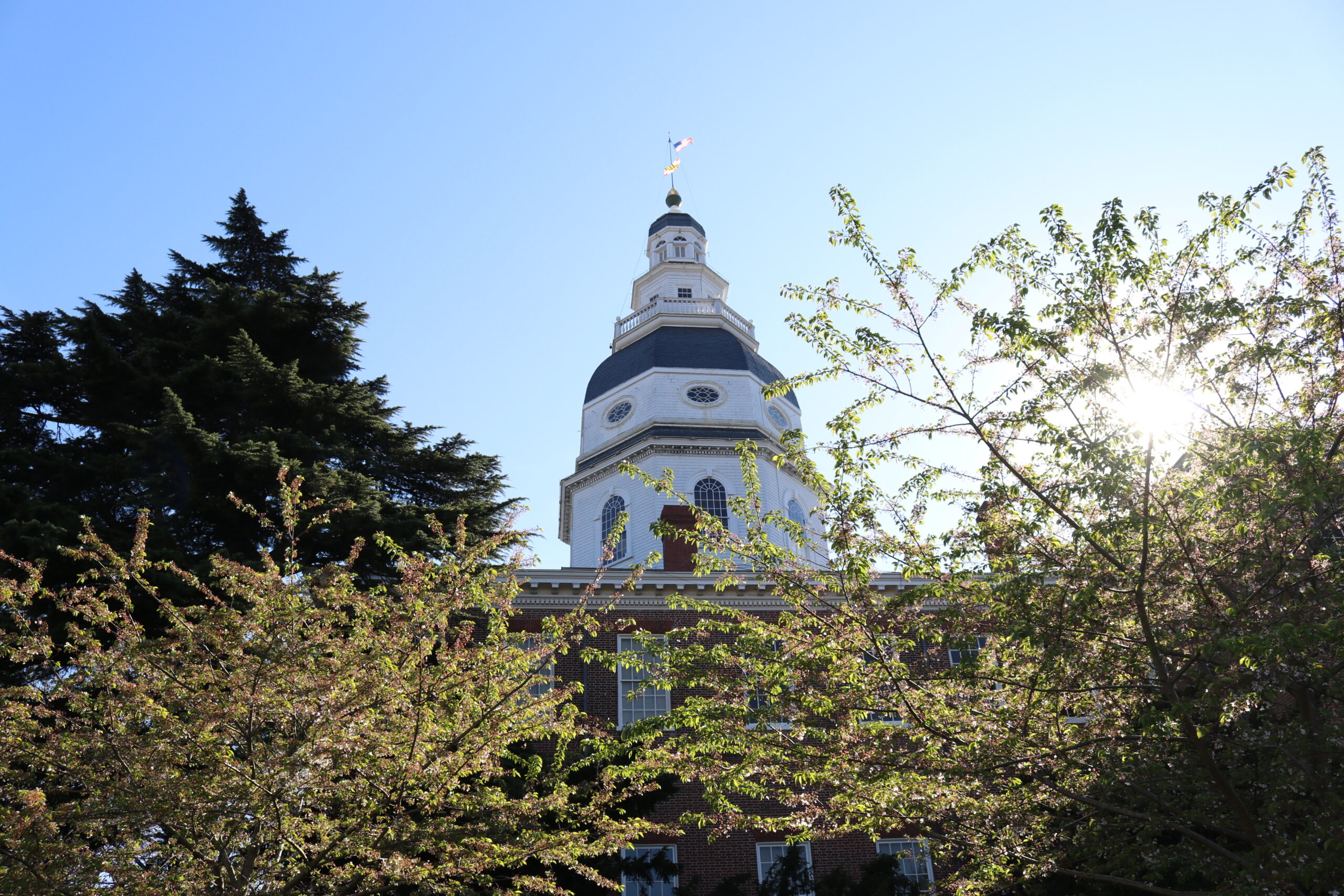The Pandemic Inspired Passage of Unionization Bills, But Vetoes Mean Fight Continues

After eight years, an effort to expand collective bargaining rights to all employees at Maryland’s 16 community colleges finally made it through the General Assembly relatively smoothly in 2021.
With the exception of one year, the bill had never previously moved past its initial bill hearing.
But even after the Maryland Association of Community Colleges withdrew its opposition after reaching a compromise with labor unions, Gov. Lawrence J. Hogan Jr. (R) vetoed Senate Bill 746/House Bill 894, which establishes collective bargaining rights on community college campuses, along with two other collective bargaining measures in higher education.
“The governor has really thumbed his nose at organized labor in the state,” said Del. Jared Solomon (D-Montgomery), the House sponsor of Senate Bill 9/House Bill 486, another vetoed collective bargaining bill that would have consolidated the bargaining process within the University System of Maryland.
In his veto letter, Hogan said that these bills “seek to address problems that do not exist and change labor practices that have worked for decades, while creating several burdensome fiscal and operational hardships.”
But labor unions and pro-union lawmakers contend that those “problems” — most recently the struggle over workplace protections during a global pandemic — are very real concerns for adjunct professors at community colleges, who typically make up more than half of the colleges’ faculty but do not have the right to collectively bargain.
Although housekeepers and maintenance workers at the University System of Maryland’s institutions have bargaining rights, the union which represents USM employees, American Federation of State, County and Municipal Employees (AFSCME) Council 3, say they’ve had trouble reaching labor agreements with college campuses during the pandemic.
Long before the COVID-19 pandemic, adjunct professors at community colleges have been voicing concerns about having their classes cancelled last minute or not having space to hold office hours. But without bargaining rights, it has been difficult to have a voice in administrators’ decision making. By the same token, employees at USM have been asking for a more efficient bargaining process for years.
As COVID illuminated the importance of decisions affecting workers’ health, bills that have failed in past years passed through the legislature with veto-proof majorities.
“The pandemic highlighted the need for folks to have a voice at their workplace — we were hearing stories of people being forced to go back to work and the workers had absolutely no say during those decisions,” said Travis Simon, the political director of Service Employees International Union Local 500.
When COVID hit Maryland, Joan Bevelaqua, an adjunct professor who teaches art at Howard Community College and Prince George’s Community College, said she had to take mandatory training courses and prepare all her courses online with no extra pay or benefits.
Bevelaqua has been advocating for bargaining rights for employees at community colleges since 2014, when an iteration of the bill was first introduced. This means eight years of talking with county executives and legislators, educating other colleagues about the power of unionization, as well as the general public, who were sometimes unaware of what an adjunct professor was, she said.
“At this point, my work for the collective bargaining bill is not for me anymore — it’s for my younger colleagues who will be benefiting from this for years to come,” Bevelaqua said.
A long time coming
Although Travis Simon has been a part of SEIU Local 500 for a decade, he became its new political director in 2019, bringing new energy to collective bargaining efforts that needed revitalization after seven years of introduction.
“He had a fresh perspective, and this may have made a positive difference,” said Sean Johnson, the executive director of the Maryland State Education Association, the largest union in the state.
Simon coached a coalition of advocates, coordinating the intricacies of the legislative process in collaboration with MSEA, AFSCME and others, and mapping out a detailed strategy a year in advance. This included preparing a veto override campaign.
Although an iteration of SB 746 was introduced in 2020, labor unions focused their attention on passing the Blueprint for Maryland’s Future, the multi-billion-dollar education reform plan intended to close student achievement gaps and transform the state’s education system over the next decade.
This year’s collective bargaining bill came on the heels of the Blueprint’s success and its multi-year conversation about a holistic approach to education, from early childhood to college, and the importance of including educators’ voices in administrative decisions.
The Blueprint was a “natural link” to community colleges and highlighted the important role community colleges play in building an education system that is the best in the nation — whether that is for dual enrollment in high school or the beginning of an advanced degree, Johnson said.
Taking a short break in 2020 also allowed labor unions to build better relationships with the new House and Senate leadership and coalition partners, all amounting to a better footing on the issue this year, Simon said.
Del. Keith E. Haynes (D-Baltimore City), the sponsor of HB 894, said that other factors, such as assured support from county executives, were also critical in his bill’s success after the past seven years of little progress.
Democratic leaders from seven jurisdictions — Baltimore City and Anne Arundel, Baltimore, Frederick, Howard, Montgomery and Prince George’s counties — expressed their support for the measure, which is critical because community college funding requires a strong relationship between the state and local government, Johnson said.
In previous years, county executives had not been loud in their opposition, but they had not been loud in their support either, Johnson said. “This year, they were loud in their support and that made a significant difference,” he said.
Change in leadership in the legislature also “made a huge difference,” Simon said.
“That sort of broad support from advocacy to leadership to county executives created a rising tide to help this bill get passed this year,” Haynes said. “Previous year’s efforts really gave rise to the solid support that we had to get this done this year.”
For the first time, labor unions and community college leaders were able to work together and agree on a compromise. Unlike previous bills, SB 746/HB 894 would delay workers’ ability to bargain over salary and wage increases by a year or two, depending on the college’s size. It also reduced the number of bargaining units from six to four.
Bernard Sadusky, executive director of the Maryland Association of Community Colleges, said he withdrew his opposition when he got confirmation from the financial chairs of both chambers — Sen. Guy Guzzone (D-Howard County) and Del. Maggie McIntosh (D-Baltimore City) — that community colleges would receive full funding from the Cade formula, which divides community college appropriations between the state, local governments and student tuition, but has been historically underfunded.
Although Sadusky agrees that there may be increased costs for community colleges as a result of this bill — which Hogan argued in his veto letter — the amendments and increased funding from the Cade formula compensated for increased costs, Sadusky said.
This year was different in that “there was an absolute attempt to write a manageable bill that we were able to be a part of the process to amend,” he continued.
“This bill was never going to go away,” he said. “After eight years of dealing with this, this bill will pass in one form or another.”
SB 746/HB 894 passed with a veto-proof majority, and “we are pretty confident that a veto override will happen,” Simon said. “We have always planned that Hogan would veto the bill and that we’d be going into the next session working on an override, so this changes nothing.”
Since the bill is set to take effect in September 2022, Hogan’s veto would not delay its implementation if an override effort is successful.
Other vetoes
Another bill that Hogan vetoed was Senate Bill 9/House Bill 486, which would require the chancellor of the University System of Maryland to act on behalf of all the system’s institutions in all aspects of collective bargaining, consolidating the process at the top.
This was the third year that an iteration of the bill was introduced, and it passed both chambers with veto-proof majorities.
Currently, across USM’s 12 institutions, there are 16 different contracts that get negotiated, according to AFSCME Council 3. When an individual campus reaches an agreement with a bargaining unit, it must then get approved by the system-wide chancellor. If rejected, the bargaining process starts over again.
Not only is this an inefficient system, but it is also expensive, AFSCME argues.
“COVID really brought to the forefront the fact that the universities were not dealing with issues in a coordinated or calculated way; they were dealing with it in a piecemeal manner, which was harmful to people’s health and safety – whether that was the faculty or students,” said Patrick Moran, the president of AFSCME Council 3.
Moran said he expects the veto will get overridden in the next legislative session, but the 10-14 months delay is a missed opportunity for USM to begin working with its employees before the new school year begins.
“My frustration is that the university system could have started to prepare and work with their employees and institutions across their system to figure out the best way to implement the changes in the bill,” Solomon, the bill sponsor, said. “But I think the university system is going to operate as business as usual until this bill goes into effect, assuming we override the veto.”
USM said that it will start working on a new bargaining process once the bill becomes law.
“Given that USM institutions vary in size, mission, and geographic location in the state, the USM opposed this legislation because it believes these negotiations should continue to occur at the campus level. However, once this bill becomes law, the USM will be prepared to comply,” said Mike Lurie, spokesman of University System of Maryland.
Hogan also vetoed Senate Bill 717/House Bill 904, which would require a meeting between new state and college employees and their potential labor union within their first pay period.
Without the bill, it is hard for unions to communicate with new employees, according to AFSCME Council 3. It also passed with a veto-majority in both chambers.




 Creative Commons Attribution
Creative Commons Attribution